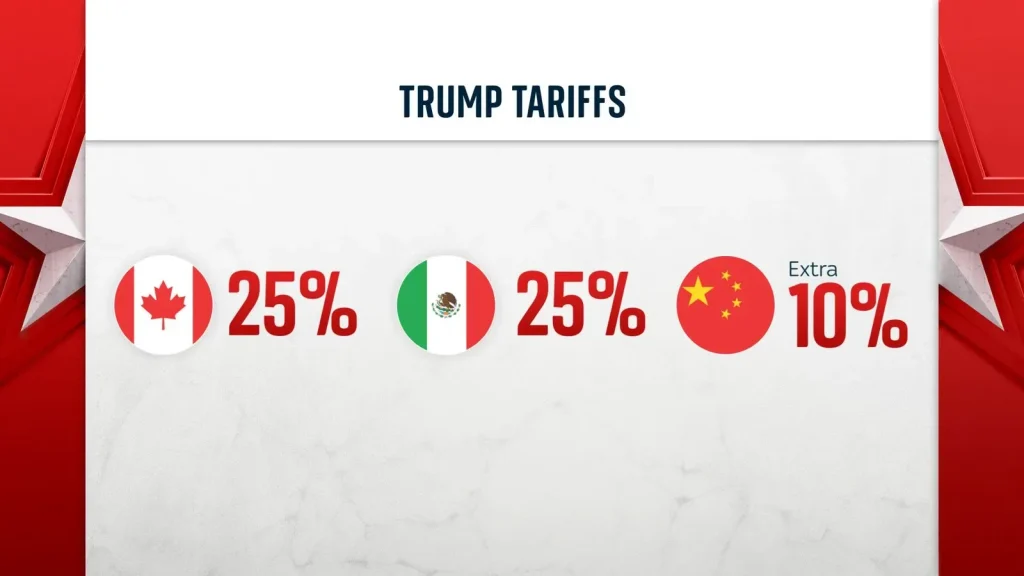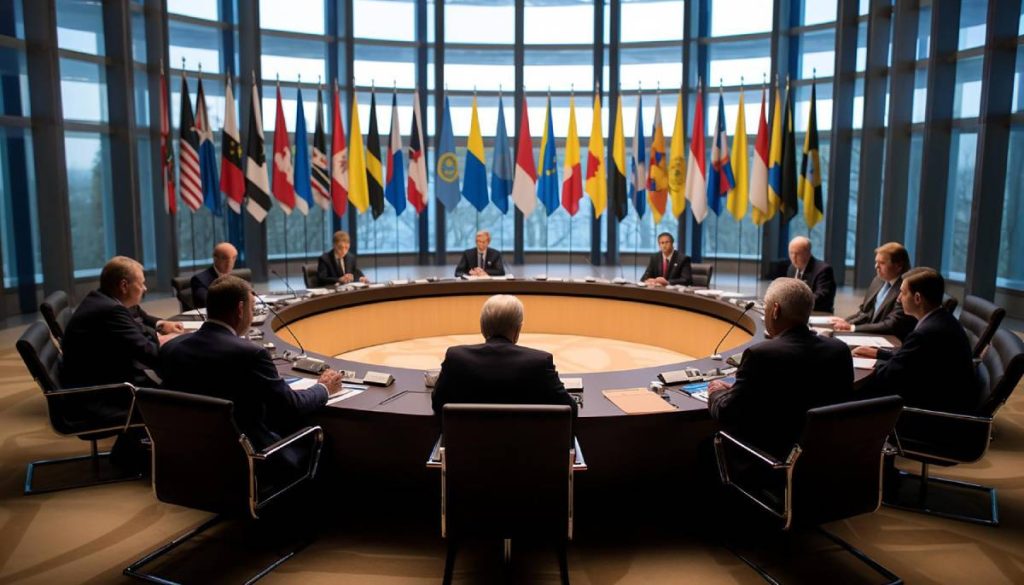The discussion surrounding Trump tariffs has become a focal point in the ongoing debate over U.S. trade policy. Recently, key economic advisers to President Donald Trump have stepped forward to defend the tariffs, insisting they are here to stay despite facing multiple legal challenges. As this controversial tariff policy continues to play a significant role in shaping international trade relations, the stakes are high with potential rulings from the U.S. Supreme Court looming on the horizon. Kevin Hassett, National Economic Council Director, expressed strong confidence that the judiciary would support these trade tariffs, which have sparked intense discussions about their legality and economic implications. Amid these tensions, many analysts are closely monitoring the evolving legal landscape and its impact on America’s future economic strategies.
The term ‘Trump tariffs’ refers to the various trade duties enacted during the Trump administration, which have generated considerable debate among policymakers and the public. This contentious tariff strategy, a crucial element of Trump’s broader economic agenda, has faced numerous legal obstacles since its inception. As the legal system grapples with this intricate tariff policy, questions rise regarding the potential outcomes of impending decisions from higher courts. Some advisers have maintained that these trade tariffs are essential for bolstering U.S. economic strength, even as critics argue that they may lead to detrimental effects on both domestic markets and international relationships. This ongoing saga encapsulates not just a legal battle, but a profound shift in how trade is navigated and negotiated in today’s global economy.
The Ongoing Legal Challenge to Trump Tariffs
The Trump administration’s tariffs are currently embroiled in a messy legal battle, particularly following a recent ruling by the U.S. Court of International Trade. This court determined that the International Emergency Economic Powers Act does not give the president the authority to impose broad tariffs on imports. As this legal challenge unfolds, Trump’s economic advisers, including National Economic Council Director Kevin Hassett, assert that they are optimistic about the outcome. Hassett expressed confidence that the Supreme Court would uphold these tariffs despite the obstacles they face, emphasizing the importance of these tariffs as a crucial component of Trump’s trade policy.
The legal issues surrounding Trump’s tariffs inject uncertainty into the administration’s plans. With the possibility of the case reaching the U.S. Supreme Court, the stakes are high for both the administration and the American economy. Officials have warned that a ruling against the tariffs could hamper the president’s negotiating power on the international stage, leading to concerns about retaliatory tariffs from other countries. As this legal fight continues, advisers stress their commitment to maintaining the current tariff structure, hinting at alternative strategies should their initial plan be overturned.
Economic Implications of Tariff Policies
The economic landscape of the United States is heavily influenced by Trump’s tariff policies, which were introduced in response to significant trade deficits. Tariffs are meant to encourage domestic production by making imported goods more expensive. However, these policies have drawn criticism from various sectors of the economy that argue they may lead to increased prices for consumers and retaliatory measures from trading partners. The potential economic ramifications of the ongoing legal battles surrounding these tariffs could create a ripple effect, impacting not only U.S. markets but also global trade dynamics.
While Trump’s advisers maintain their optimistic outlook regarding the durability of these tariffs, the uncertainty created by judicial scrutiny complicates the economic forecasting for the near future. Analysts continue to monitor how both domestic and international markets respond to the legal challenges and especially how the Supreme Court may ultimately rule. The outcome could set a precedent for future trade policies and affect the administration’s broader economic strategies, making the legal fate of Trump’s tariffs a critical element in shaping the economic environment.
Trump’s Economic Advisers and Their Stance
Trump’s economic advisers, notably Kevin Hassett and Commerce Secretary Howard Lutnick, have been vocal in their defense of the current tariff regime. They argue that tariffs are instrumental in addressing the longstanding trade issues the U.S. faces, particularly against countries like China. Despite recent legal challenges, they remain steadfast in their belief that the tariffs will not only survive this court battle but are necessary for protecting American interests globally. Their confidence comes amid concerns that overturning these policies could undermine America’s position in international trade negotiations.
In defending these measures, Trump’s advisers have also pointed out the broader implications of legal rulings on the administration’s authority to impose tariffs. They suggest that a negative ruling could weaken America’s strategic use of economic tools in negotiations, potentially exposing the country to exploitation by foreign powers. This belief underscores the urgency and importance that the administration places on the continuation of tariffs as a mechanism for enforcing fair trade practices, hinting at further plans to ensure that these tariffs remain part of the economic framework.
The Role of the U.S. Supreme Court
The looming presence of the U.S. Supreme Court in the ongoing legal discussions surrounding Trump tariffs cannot be understated. As various lower courts weigh in on the legality of these tariffs, the ultimate decision from the Supreme Court will have far-reaching consequences. Observers note that a conservative majority on the court raises questions about how favorably the justices might view presidential power concerning trade and tariffs. The administration’s legal team is preparing for this possibility, emphasizing that they feel confident the Supreme Court will ultimately uphold Trump’s tariffs.
The legal interpretations and outcomes in the high court will not only affect current tariffs but could establish critical precedents for future presidential actions involving tariffs and trade policies. Analysts and legal scholars are keenly observing how the Supreme Court approaches the issues of executive power versus congressional authority in matters of international trade. This developing situation underlines the intertwined nature of law and economics, particularly as it relates to Trump’s aggressive trade strategies aimed at rejuvenating American manufacturing and addressing trade imbalances.
Alternatives to Trump’s Tariff Policy
While Trump’s advisers project confidence in the longevity of the tariff policy, they acknowledge the possibility of an adverse ruling from the courts. Under such circumstances, they have hinted at exploring alternative routes to achieve similar goals related to trade fairness and economic security. The nuances and particulars of these alternative strategies remain largely unspecified, indicating a level of complexity inherent in U.S. trade policy. Nevertheless, the administration’s readiness to adapt suggests an understanding of the importance of maintaining a robust trade agenda.
This contingency planning is indicative of the administration’s strategic focus on ensuring that America retains a strong negotiating position. Even if the tariffs face legal setbacks, the administration’s commitment to trade reform appears unwavering. The economic advisers hint at a variety of other legal frameworks that could be employed to maintain pressure on foreign nations to comply with fair trade practices, showcasing the complexities and dynamic nature of U.S. trade policy amidst legal uncertainties.
International Responses to U.S. Tariff Policies
As the Trump administration navigates the legal challenges regarding tariffs, international reactions have also been noteworthy. Countries like the EU and China have been preparing countermeasures in response to the trade duties implemented by the U.S. Increased tariffs can provoke a cycle of retaliatory measures that may lead to an escalating trade war, affecting global economic stability. The potential for international responses highlights the delicate balance that must be struck between protecting domestic industries and maintaining healthy international trade relations.
Economic advisers have stressed the importance of securing U.S. interests without alienating vital trade partners. The ongoing disputes over tariffs have led to complicated dialogues between nations, with many looking to broker solutions that avoid full-scale trade conflicts. As Boris Johnson, the UK’s Prime Minister, and other leaders approach negotiations, the influences of U.S. tariffs loom large in discussions about trade agreements and economic cooperation.
Impacts on American Consumers and Businesses
The imposition of tariffs under Trump’s administration has immediate implications for American consumers and businesses. Businesses that rely on imported goods are faced with increased costs due to these tariffs, which can lead to higher prices for consumers. The direct impacts are visible in everyday shopping experiences, where consumers begin to see the effects of trade tariffs reflected in higher prices for products. This raises questions about the long-term sustainability of such economic policies, especially in light of potential court challenges to their validity.
Moreover, some industries may find themselves at a competitive disadvantage due to these tariffs. National Economic Council Director Kevin Hassett and other advisers argue that the long-term benefits of tariffs will outweigh initial costs, as they aim to revitalize American manufacturing. However, it remains to be seen how widely this viewpoint is shared among constituents, as the immediate financial pinch may lead to growing discontent among the electorate. Thus, the intricacies of these tariff policies bring to light a broader conversation regarding economic fairness and the actualization of an equitable trade environment.
The Future of Trade Relations Under Tariffs
Looking forward, the future of trade relations under President Trump’s tariff policies remains fraught with uncertainty. Should the tariffs remain in place following judicial review, they could redefine America’s role in global trade dynamics. The administration’s push for fair trade practices could alter negotiation strategies with key partners like China and the EU. The evolving situation necessitates close monitoring of international responses and shifts, as Trump’s approach to tariffs remains both a defining aspect of his presidency and a critical factor in the U.S.’s global economic standing.
In light of potential future challenges, Trump’s advisers indicate that the administration is prepared to pivot if necessary, ensuring the U.S. continues to prioritize favorable trade terms. This flexibility may become crucial in maintaining leverage during negotiations and addressing any economic fallout from ongoing trade disputes. Consequently, the evolving outcomes related to Trump’s tariffs could have lasting impacts not only on the U.S. economy but also on international trade policies well into the future.
Frequently Asked Questions
What are Trump tariffs and how do they affect trade?
Trump tariffs refer to the set of trade tariffs imposed by President Donald Trump on various imports as part of his tariff policy aimed at protecting American industries. These tariffs have created significant impacts on global trade relationships and have led to legal challenges regarding their implementation.
How did legal challenges impact Trump’s tariff policy?
Legal challenges have played a central role in determining the future of Trump’s tariff policy. A U.S. Court of International Trade recently ruled that the International Emergency Economic Powers Act (IEEPA) does not permit the president to impose universal tariffs on imports, creating uncertainty for Trump’s tariffs amid appeals.
What is the U.S. Supreme Court’s potential role in Trump’s tariffs?
The U.S. Supreme Court may ultimately decide on the legality of Trump’s tariffs if the ongoing appeals reach this level. The Court’s ruling could have significant implications for the enforcement of trade tariffs and the scope of presidential authority under the IEEPA.
What are President Trump’s economic advisers saying about tariffs amid legal fights?
Trump’s economic advisers, including National Economic Council Director Kevin Hassett, have expressed confidence that the tariffs will remain in place despite legal challenges. They believe the courts will uphold Trump’s tariff policy, emphasizing the importance of these measures for U.S. economic strategy.
How have other countries responded to Trump’s trade tariffs?
Many countries have prepared countermeasures against Trump’s trade tariffs, indicating that international trade relations have been strained. The European Union has expressly stated its intent to impose countermeasures in response to heightened tariffs on imports from other nations.
What alternatives might the Trump administration pursue if tariffs are blocked by the courts?
If legal challenges successfully block Trump’s tariffs, the administration has indicated it has various alternatives and other laws that could be invoked to maintain a robust trade policy that aligns with their aim of ‘making America trade fair again’.
How do Trump tariffs reflect on America’s global trade position?
Trump tariffs represent a departure from traditional trade practices by prioritizing national protectionism. The administration argues that such tariffs help address trade deficits and strengthen the U.S. economy, thereby reshaping America’s global trade position.
What is the significance of the International Emergency Economic Powers Act (IEEPA) regarding Trump’s tariffs?
The IEEPA was invoked by Trump to justify the imposition of sweeping tariffs. However, recent court rulings challenge the extent of this authority, underscoring the legal complexities surrounding the implementation of Trump’s tariff policy.
| Key Point | Details |
|---|---|
| Tariffs Are Staying | Trump’s advisers, including Commerce Secretary Howard Lutnick, assert that tariffs are not going away despite legal challenges. |
| Legal Challenges | The legal battle surrounding the tariffs could reach the U.S. Supreme Court, following a lower court ruling opposing the tariff’s legality. |
| Confidence in Court Rulings | National Economic Council Director Kevin Hassett expressed confidence that the Supreme Court would uphold the tariffs. |
| Alternatives to Tariffs | Hassett mentioned possible alternatives if tariffs are overturned, though specifics were not disclosed. |
| Impact of Tariffs | The tariffs, according to Trump, are crucial for protecting U.S. economic interests against foreign tariffs that could harm the U.S. economy. |
Summary
Trump tariffs remain a contentious and pivotal part of U.S. trade policy. Amid ongoing legal challenges, Trump’s advisers are adamant that these tariffs will stay in place to protect American interests. As the situation progresses to higher courts, the implications of these tariffs will continue to reshape the landscape of international trade and U.S. economic strategy.



